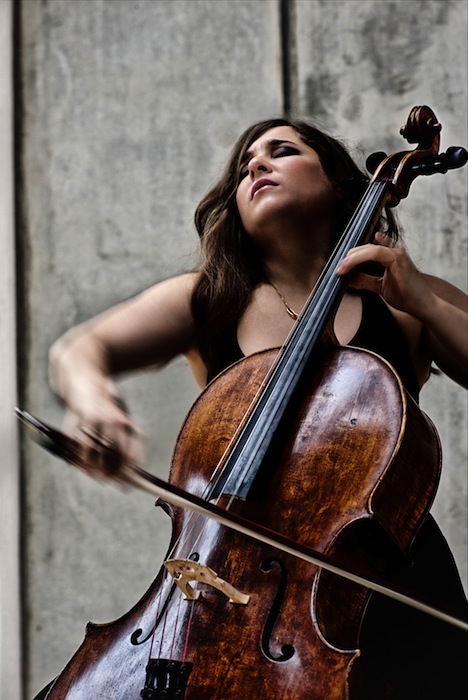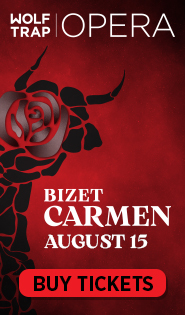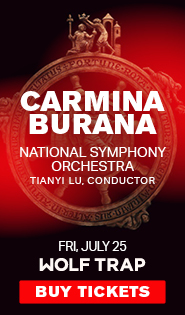Eschenbach, NSO prepare a rough draft for Russian tour

Alisa Weilerstein performed Shostakovich’s Cello Concerto No. 1 with Christoph Eschenbach and the National Symphony Orchestra Thursday night. File photo: Harald Hoffmann
Christoph Eschenbach will take the National Symphony Orchestra to Russia to perform at the Rostropovich Festival at the end of the month, the fourth international tour under his leadership. The tour programming is drawn partially from the ensemble’s ongoing tribute to its former music director, Mstislav Rostropovich, marking the tenth anniversary of his death and what would have been his 90th birthday.
On Thursday in the Kennedy Center Concert Hall Eschenbach offered a rough preview of the last of the pieces it will present in three concerts in Moscow and St. Petersburg.
Emphasis on rough, as the results were not yet fully formed. The dubious honor of trying to replace Rostropovich in Shostakovich’s Cello Concerto No. 1 fell this time to Alisa Weilerstein.
Orchestra and soloist took a while to warm to each other in the exposed first movement, as Weilerstein was unpredictable in tempo. The American cellist had trouble projecting the needed howl of anguish on the A string, much as Sol Gabetta did when she played the work with the NSO in 2013. Abel Pereira provided excellent horn solos, always in step and balance with the soloist, while the contraforte tended to overwhelm both Weilerstein and the other woodwinds.
Weilerstein was most incisive in the second movement, using a reduced vibrato to heighten the blue-note impact of the part’s melodic gestures. Pereira was again sumptuous in tone. As soon as the orchestra rose in volume, they submerged Weilerstein in sound, but she was at the top of her game in the eerie harmonics section that ended the movement. Accompanied by the celesta, this music had the feel of some half-remembered folk tune the Soviet authorities no longer allowed to be sung.
In keeping with her understated approach, Weilerstein took much of the extensive cadenza sotto voce, taking too much time over the pizzicato chords. Although she dragged out much of it, Weilerstein rushed through the double-stops and other technical challenges at the end, trying to substitute brash intensity for virtuosic accuracy. The berserk folk dance of the finale also needed more bravura tone from the soloist, who had the notes lined up in her left hand but played in a mostly subdued way that cheated this demanding score of some of its thrill.
Eschenbach’s interpretation of Schubert’s Eighth Symphony (“Unfinished)” for the 2016 tour was odd and surprising, inspiring hopes for his take on Schubert’s Ninth Symphony heard Thursday.
The NSO musicians produced many beautiful sounds, from the placid horn introduction to limpid strings, but Eschenbach’s often erratic gestures made for a rough shifting between tempo sections in the first movement. Eschenbach kept the soft dynamics very soft, which created an air of mystery around some of the startling harmonic transformations, key moments in Schubert’s music.
A martial approach propelled the second movement, the crisp dotted rhythms in the well-played oboe main theme like a march. Easing the tempo rounded off the edges of the B section, important since this movement is the only real moment of repose in a long symphonic work that can become stultifying. When the opening music returned, it seemed ineffectively slower than the first time around.
Similar problems came to the fore in the third movement, as Eschenbach’s approach was overly pushy in the scherzo, creating some chaotic ensemble. Likewise in the Finale, the tempo was so fast that the triplet figures were mostly blurred together indistinctly, although it later settled into a buoyant lightness.
The NSO has not played Tobias Picker’s Old and Lost Rivers, a favorite of Eschenbach’s during his tenure with the Houston Symphony Orchestra, since 1998. The score creates a sweet, soothing sense of stasis, studiously avoiding any clear cadence for six or seven minutes. It is an odd choice for a concert opener, but the NSO played it beautifully.
The program will be repeated 8 p.m. Saturday. kennedy-center.org; 202-467-4600.


